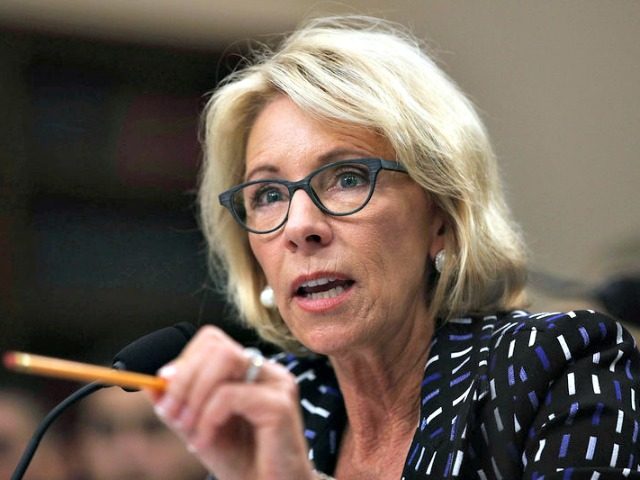U.S. Education Secretary Betsy DeVos took to task state school chiefs who, she said, operate “as if your work was only accountable to folks in my office.”
DeVos made her comments in her keynote address Monday to the Council of Chief State School Officers (CCSSO) 2018 Legislative Conference in Washington, DC. Stating her remarks amounted to “tough love,” the secretary told the chiefs she has seen little evidence of their use of the federal Every Student Succeeds Act (ESSA) to develop education plans that best meet the needs of students.
The CCSSO is one of the owners – along with the National Governors Association – of the Common Core State Standards.
DeVos said the purpose of ESSA is to “prohibit federal control of education.”
The law is the most recent version of the Elementary and Secondary Education Act (ESEA), and one that replaced No Child Left Behind (NCLB). The ESEA was signed into law in 1965 by President Lyndon Johnson as part of his “War on Poverty” program.
“Whatever the reasons, I see too many plans that only meet the bare minimum required by the law,” she continued. “Sure, they may pass muster around conference tables in Washington, but the bare minimum won’t pass muster around kitchen tables. And I’m not alone in this view.”
DeVos has been a proponent of ESSA, and said the federal law “invites a different approach” that encourages states to use “flexibility” to meet the needs of their students.
She chastised school chiefs of states with accountability plans “that were so complicated, schools would be accountable to no one.”
“We must do better for parents,” the secretary insisted. “For students. For our country.”
“[O]ur children deserve better than the 19th century assembly-line approach,” DeVos added. “Or the “NCLB” approach. Or the ‘RTTT’ [Race to the Top] approach. The ‘Washington knows best’ approach.”
“[T[he imperative to do something shouldn’t have to come from Washington,” she said. “It shouldn’t have to come from your state capital. The imperative to do better comes from students. We are accountable to them!”
While DeVos asserted ESSA offers states more freedom, the law still requires the federal education department to approve of state education plans and mandates annual testing.
Many conservative education policy analysts and grassroots parents, who studied ESSA prior to its enactment, found that the federal law actually imposed the Obama-era Common Core standards on the entire country.
Following approval of ESSA, American Principles Project senior fellow Emmett McGroarty wrote at The Pulse 2016, “Anti-Common Core activists tried for months to warn Congress that the new federal education bill … was a disaster that would cement, not overturn, the odious progressive-education philosophies of the Obama Administration.”
“Now comes confirmation that the activists were dead on — and that Republican leadership, including Sen. Lamar Alexander, Rep. John Kline, and House Speaker Paul Ryan, carried out a cynical scheme to betray their constituents and give the Administration everything it wanted,” McGroarty continued, citing a Politico Pro interview with former Obama education secretary Arne Duncan.
“[I]f you look at the substance of what is there … embedded in the law are the values that we’ve promoted and proposed forever,” Duncan said. “The core of our agenda from Day One, that’s all in there – early childhood, high standards [i.e., Common Core], not turning a blind eye when things are bad. For the first time in our nation’s history, that’s the letter of the law.”
According to The Republic, some state school chiefs “pushed back” against DeVos’s “tough love” with complaints about federal education spending cuts:
Speaking in the wake of the Florida school shooting that left 17 people dead, Tony Smith, the Illinois state schools superintendent, said the Trump administration was cutting federal funding for education, including school safety.
“All of the cuts that are proposed do make it more difficult to do some of the things that people here want more of,” Smith told reporters after he and his colleagues met with DeVos.
Kirsten Baesler, the North Dakota education chief, agreed. “It certainly makes our job harder to keep our students safe when our resources are being cut back or eliminated,” she said.
However, Kentucky Education Commissioner Stephen Pruitt reportedly noted inconsistency in DeVos’s grading of the state education plans.
He said DeVos rejected a proposal from his plan regarding school evaluation, but kept the same one in the plan from Georgia.
“There is a lot of inconsistency in how those reports have been done,” Pruitt said. “I had to move it out of mine, get my state board to agree to that, but it got approved in other places.”
DeVos also told state school chiefs they needed to have an “open and honest conversation about what went wrong” in Parkland, Florida where a 19-year-old young man with multiple incidents of past aggressive behavior went on a high school shooting rampage that killed 17 people.
“No student, no parent, no teacher should ever have to experience what many did at Marjory Stoneman Douglas High School,” she said.
“We must have an open and honest conversation about what went wrong, and what we must do now to ensure our children are safe at school,” the secretary continued. “I look forward to hearing your ideas and working with you. I know we may sometimes differ on what policy levers to pull, as there is no one-size-fits all approach for every state, or for every community. And there will be varying solutions. I hope we can always stay focused on individual students.”

COMMENTS
Please let us know if you're having issues with commenting.